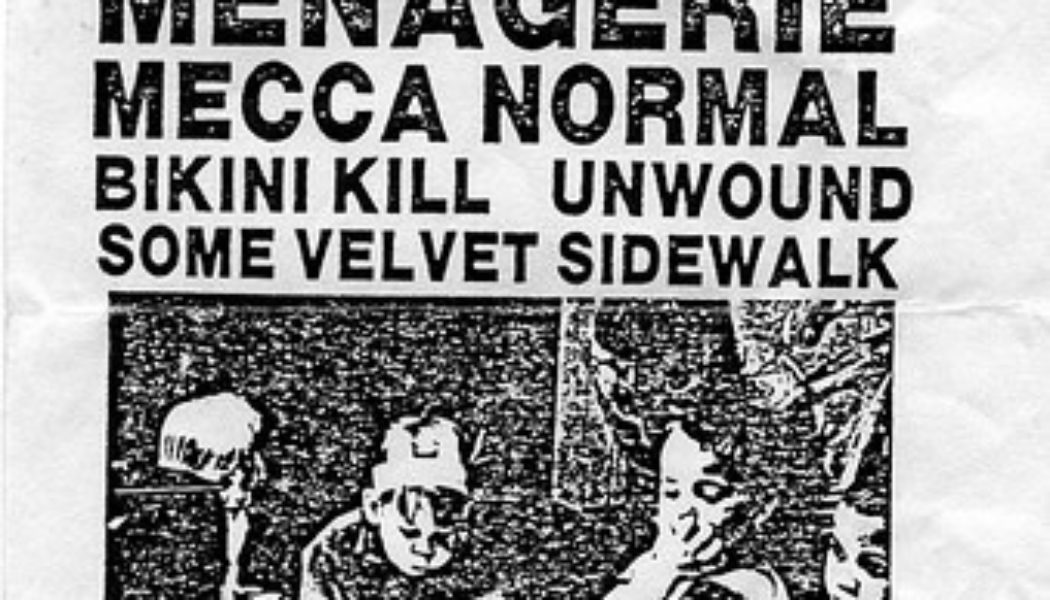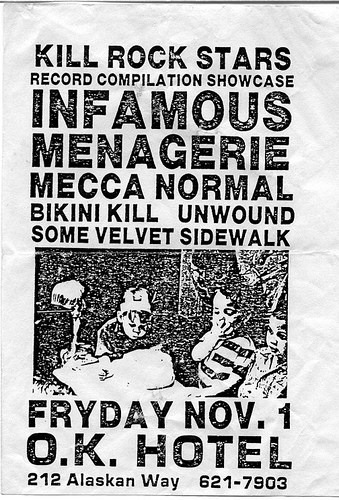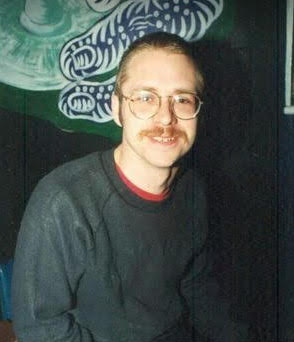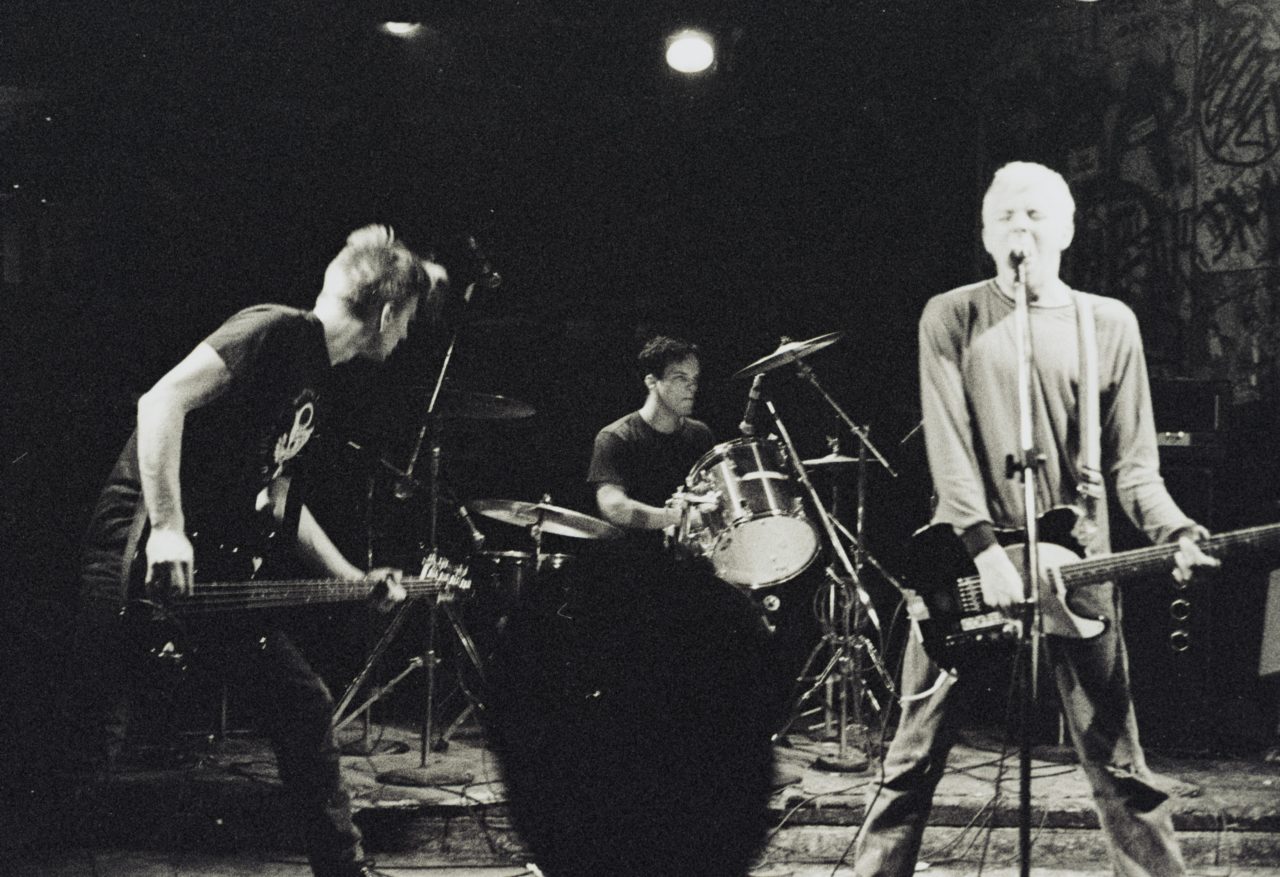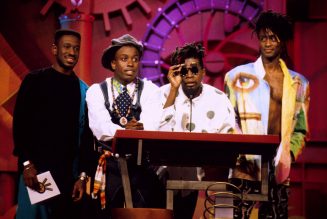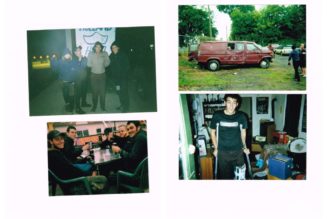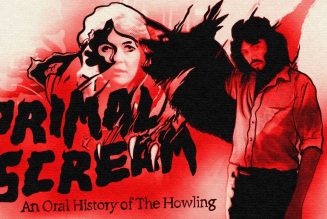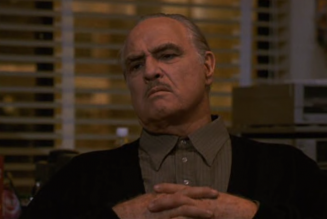In NOFX’s song “Kill the Rock Stars,” Fat Mike calls out Bikini Kill singer Kathleen Hanna with the lyric, “‘Kill the rockstars’ how ironic, Kathleen/You’ve been crowned the newest queen,” and opines, “You can’t change the world by blaming men.” The song title not subtly references Kill Rock Stars, Bikini Kill’s label at the time. The 24 years since the song was included on the pop-punk band’s 1997 album So Long and Thanks for All the Shoes have not been kind.
Both Bikini Kill and Kill Rock Stars’ roster over its 30-year history have, in fact, changed the world. The label is best known for important releases from Riot Grrrl bands such as Bikini Kill, Bratmobile, and Heavens to Betsy. The feminist punk (or punk feminist) movement has been idealized, criticized, relitigated, historicized and fictionalized, only to resurface again in the new Gen Z incarnation on TikTok, which is to say it mattered and still does.
NOFX did have one valid point: The label’s name soon became ironic.
In addition to fostering Riot Grrrl bands like those already named, the small label founded by Slim Moon and Tinuviel Sampson in Olympia, Washington in 1991, minted one unconventional icon after another, helping launch Miranda July, Elliott Smith, Sleater-Kinney, The Decemberists and both Gossip and its frontwoman Beth Ditto into something like mainstream stardom. In the process, it helped establish the template for much independent music that would come later.
Today, Kill Rock Stars is based in Nashville and continues to release music, but, backtracking to the summer of 1991, Slim, a performance poet and occasional punk rock frontman in a band called Witchy Poo with Sampson, started the label to put out spoken-word recordings. An hour north in Seattle, Nirvana was about to release “Smells Like Teen Spirit.” K was preparing to hold the International Pop Underground Convention, a one-off music festival that would make Olympia a player in the Pacific Northwest music scene, which was about to get very hot.
With a nudge from K founder, Calvin Johnson, Slim ended up following through on an idea to put out a compilation. Titled Kill Rock Stars, that compilation would feature bands such as Unwound, Bikini Kill, Bratmobile, and Heavens to Betsy, who became mainstays on the fledgling label. It also fatefully included the Nirvana song “Beeswax,” which later be included on the band’s 1992 compilation album Incesticide. Nirvana was supposed to play the convention but couldn’t. Partly due to their inclusion, the record sold well, enabling further releases.
To mark the 30th anniversary of this incident, Slim and many of the musicians who made up Kill Rock Stars’ history spoke to SPIN about everything that happened after that. Tinuviel Sampson is recovering from COVID and could not participate.
DIY Beginnings
Slim Moon: I initially thought up a compilation that was going to be all Olympia bands to try to sell it at Calvin and [K Records co-owner Candice Pedersen]’s convention. And it was a month away from the convention. So, it was really late when I thought of this. And the reason I thought of it was because I saw Unwound’s first show and I just thought, “Maybe I will become a rock record label, because somebody needs to put out their records.”
Then I went home and decided it was too late. But then Calvin ran into Justin [Trosper] from Unwound on the street and Justin told him the idea that I had. I had told Justin after the show. Calvin liked the idea and called me up. He said, so you’re going to do this compilation? I said, “No, it’s too late. There’s no way.” And he said, “Well, I’ll help you.” That day, I called a bunch of bands that I knew and asked if they would contribute to the album and Calvin called some bands that he knew. We managed to get the records made in one month, and start selling them on the second day of the convention.
Allison Wolfe (lead singer of Bratmobile): Bratmobile had a split seven inch on K Records and other split seven inches on small labels. But I think Slim finally asked us if we want to do an album. And everyone just kind of started being on Kill Rock Stars. Either that or K.
Slim: I was super excited about my friends’ bands, like Bratmobile, Unwound and Bikini Kill. I was on my way to putting out an Unwound album and a Witchy Poo album, and then the big thing happened, which is Bikini Kill, who were living in Washington, DC, called me and said, “We have recorded a record and we would like you to put it out.” And so I flew to Washington, DC to talk it over with them and make the deal and shake hands. I remember being so excited and so nervous, because, by that time, I knew how great they were and really expected them to do really well. I thought they were the best band in the world, really. So, I had to go find a distributor.
Justin Trosper (singer and guitarist of Unwound): Kill Rock Stars, and the people that became the Kill Rock Stars bands, were sort of outlier people in the already established scene.
K was that sort of minimalistic style and pop oriented indie music, you know, Beat Happening. Kill Rock Stars wasn’t necessarily a reaction to that, but it was like, “Hey, there’s other stuff going on. There doesn’t have to be just one label in town.”
Revolution Grrrl Style
Slim: I started signing a couple other Pacific Northwest bands like Bratmobile. And then another big shift that moved us forward in our thinking and what we were attempting to do was getting approached by Huggy Bear from England. They were really inspired by Riot Grrrl and really loved Bikini Kill, and they asked if we would put out their record. That was really the first band I signed that was not my friends, not from my scene. So, that was sort of a scary reach. They became friends, because I toured England for two weeks with them and Bikini Kill in ’93.
That was the craziest because NME and Melody Maker and a couple rock TV shows could turn you into the biggest thing in England overnight, so Huggy Bear was the talk of the country and they were being chased by paparazzi, and they were refusing to give interviews and the bands were not allowing cameras into the concerts. And then there was also the whole thing of beefy guys showing up to concerts and yelling, “Show us your tits!” and threatening the band in the alley afterwards. The threat of violence was there the whole tour.
Wolfe: We had backlash, but the same people who would be hating on Bikini Kill were at all their fucking shows. All the people who talk shit about them, wanted to be part of it. They were there. They wanted to be where the action was.
Slim: Early Riot Grrrl, part of the focus was talking about the patriarchy in the whole world and in our culture, but another part of the focus was very specifically the boys’ club of punk rock, you know, articles about like, girls aren’t just arm candy. They’re not just girlfriends. But the punk rock boys were offended when these women said the scene isn’t inclusive and needs to not expect women to just be in their place. They felt like they had to reflexively clap back, as we say now.
Corin Tucker (Sleater-Kinney): Slim really listened to women from the beginning, and there were a lot of women involved, like Tinuviel Sampson. Slim had a lot of, I would call them female consultants that had a lot of influence on the label at the time, like Tobi Vail, Maggie Vail, Natalie Cox. I mean, these are all women that worked there and had a lot of influence on what happened at the label.
Wolfe: When it was Slim and Tinuviel together, people were always like, because she’s an artist, “Tinuviel is the creative side of the label and Slim is like the business side of the label.” And I remember Tinuviel, kind of laughing about that once, being like, “Actually, I do both.”
Satomi Matsuzaki (Singer of Deerhoof) via email: A great thing about Kill Rock Stars is that a main workforce there are women who were musicians as well. It was great to work with women such as Maggie Vail. Her name was used once for our album, Offend Maggie. She was our main correspondent. She worked so hard.
Slim: When people asked, I kind of avoided the idea that there was sort of an affirmative action agenda or a reparations agenda, or a quota agenda. What I would say is, it’s just really important to me to put out music that is really saying something instead of just pleasant to listen to. And that’s why half or more of our bands are led by women because women are making more interesting, important music that has something to say, and a lot of the boys are just trying to sound like their heroes or are just trying to get laid. I think if you counted every musician, not just the singers, in our whole roster over the last 30 years, we were probably about 50 percent women.
Miranda July: I was definitely a fan of the label. Starting in high school and going to Bikini Kill shows. I moved to Portland and started spending more time in Olympia. It was at some kind of punk garden party, which actually does sound very Olympia in the ’90s, where I performed. It was my first real performance without The Need, with me as Miranda July. It was kind of a leap into thin air. I stepped off the stage with adrenaline coursing through me and I was back in the audience and Slim came up to me and said, “If you ever want to put something out, we’d love to.” That was my start.
Successes and Survival
Corin Tucker (Guitarist and vocalist of Heavens to Betsy and Sleater-Kinney): Slim was good at picking somebody who was not just a good musician, but who had a fire, something that they had to get out of themselves with music, and he was good at sort of fostering that. Someone like Elliott Smith, I definitely think he saw something there that other people didn’t pick up on right away.
July: It was crucial that there was total freedom and an embrace of the weird depths of a person.
Slim: I met Elliott Smith because we were both on a little tour of solo artists who were known for their bands. We spent a week going down to California and back in a van. And I really loved his music, like, it really floored me. His lyrics were so honest, and insightful. Right away, I thought he was a world class talent. And he was really going against the grain. It’s so easy to not realize what a lone voice in the wilderness he was when he put out Roman Candle and Elliott Smith. In indie rock and punk rock it was so fucking uncool to play an acoustic guitar and it was so uncool to play solo music under your own name. Every solo guy out there called themselves Smog, or Palace.
Tucker: Slim didn’t want to put Sleater-Kinney out in the beginning. He told us no, which is why our first album was released on Chainsaw. He was like, “This is a side project.” He was still bummed about it not being Heavens to Betsy, like, “I don’t know what you’re doing.”
Jamie Stewart (Xiu Xiu): They basically saved me from getting a normal job. They gave the band that I play in a stable and also embracing place to make music. The point of music for me is to be as open as possible and to push things too far, to always attempt to expand what our musical pursuits or ideas are. A lot of labels would not be supportive of that type of
malleability or that type of evolution or that amount of experimentation. Not only did they tolerate it, they encouraged and embraced it.
Slim: I had no credit for the first seven years and so we were always in this position. I was really aggressive about putting out records, probably faster than I really should have. We were always broke. We were always switching pressing plants, because we owed too much money to this guy. So, we had to go over to this other pressing plant to get a record made until enough money came in from the record we put out six months ago to pay the other pressing plant. I always prioritized paying the royalties before paying the other bills, but it was hard to tell if we were viable.
The moment finally came where I had put out a Bikini Kill record and an Unwound record in the same week, or the same month, and all the bills came due and I didn’t have enough money to pay my staff. I told Molly Neuman, who played drums for Bratmobile, “I think this might be the end. I’m gonna have to lay off the staff.” And then literally the next day I got a call saying Elliott had been nominated for an Oscar. Good Will Hunting had already increased Elliott Smith sales, but not enough. But as soon as that happened, the Elliott Smith sales went through the roof. My distributor saw that increase in sales and they fronted me some money and I was able to pay the staff.
Greg Saunier (Drummer of Deerhoof): If they had one Sleater-Kinney or Elliott Smith or Bikini Kill, that underwrote zillions of other total, just wildcards that there was just no guarantee that any of them would do anything but lose tons of money, which is exactly what their Deerhoof was, we were a big money loser. When I say that, I don’t mean on one seven inch. I mean, for the first seven or eight years of the band, everything we touched lost money. Our fourth album in 2002 was the first time Deerhoof did something that didn’t lose money. What in the world? I mean, what can I say? It’s not just taking a one time risk. It’s like devoting yourself to something that you believe in against all reason.
Slim: I didn’t provide the infrastructure for the Elliott Smiths and the Sleater-Kinneys and The Decemberists to go all the way with us. I understood when bands left us to try something bigger. I was frankly unwilling to try to become the next Sub Pop, or even the next Merge. I would have had to do long-term record contracts and tie people up for seven records and things like that.
Thao Nguyen (singer and guitarist of Thao & the Get Down Stay Down): I learned how to be a touring musician and how to be a recording artist with Kill Rock Stars and I always felt really supported by Slim and by Portia, Maggie Vail and Lauren Ross. When we came through town, we were staying with Slim and Portia. It was a very familial, very grassroots mutual aid, punk rock based ethos, you know, taking care of each other.
Tucker: There was the lack of diversity and having more people of color on the label and the fact that it was run by a white man who ultimately made the decisions. Those things made it a really imperfect situation. All of those criticisms of the label, and all of those criticisms of Riot Grrrl are completely valid, one hundred percent.
Slim: I’m ashamed and embarrassed that I had this attitude that like, well, indie rock is really white, why would black people want to be involved? I think there were great black punk rock musicians and artists and activists that we should have worked harder to include.
Trosper: In the ’90s, there were a lot of politically oriented bands that were just not very good. They didn’t really bring very interesting musical things, and they also came across as way too serious and kind of stiff and preachy. What’s cool about Kill Rock Stars is there was a political element to it all, but it was done with art, with an artistic backbone, and also a sense of humor and a sense of self-awareness.
Wolfe: People like Seth Bogart [Gravy Train!!!!, Hunx and his Punx] and Brontez Purnell [Gravy Train!!!!, Younger Lovers] would write letters to the label. They made a lot of people feel less alone in their small towns, if you were queer, or a young girl who was socially conscious, or you just felt different and you might have to live through the mail and through mail order.
And so they would write these letters and sometimes call the label and just talk to whoever would answer and then the people who are working at Kill Rock Stars, usually Maggie or Tobi would write these letters back. And there would be this kind of relationship developed. I think it was kind of a savior to a lot of people who felt isolated.
Portia Sabin: In 2007 the entire industry shifted overnight from a physical to a digital marketplace and that was an extremely difficult transition. So, within a few years of Slim leaving, I had to navigate this whole new world. In 2010, we only released one record because we just had to readjust or hunker down and see what’s going to happen with our cash flow change.
I started putting out alternative comedians, which was massive. It was fantastic. And it was lucrative. It paid. And I felt like I was getting back to Kill Rock Stars roots, like Bikini Kill and Huggy Bear and Bratmobile because most of these alternative comedians are very politically active. Cameron Esposito, W. Kamau Bell, Hari Kondabolu, these are people who have strong political views, and their art is all about their political views.
